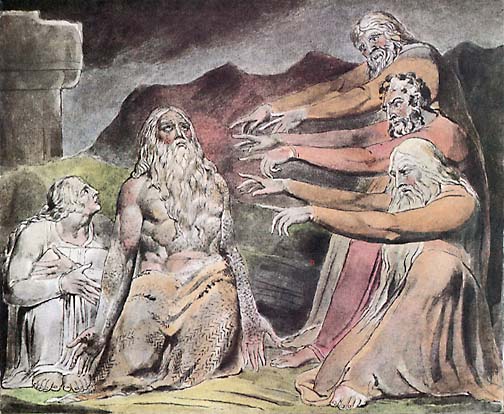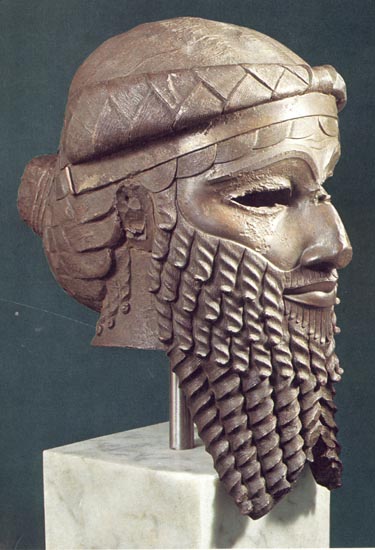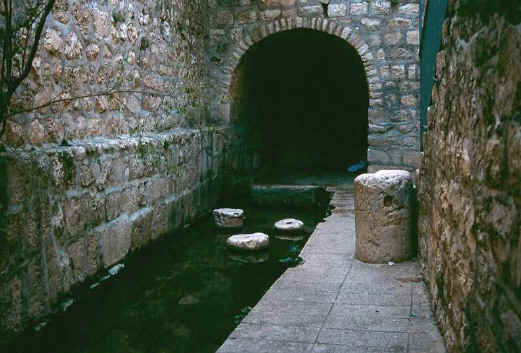Job

Jehovah and his Adversaries look down upon Job, his wife and friends
http://www.heavenlyascents.com/wp-content/uploads/2009/06/morningstars-753925.jpg
It is unknown when Job lived. Certain portions of the book of Job are certainly ancient, such as chapter one. Other portions were possibly written later. Many scholars believe Job, as we now have it, was written as late as the fifth century BC.
The Divine Council of Heaven
Job 1-2

The Divine Council of Heaven - God with his divine Sons
http://www.creativeworks.byu.edu/catalog/products/council.jpg
For many people it seems strange that Satan would join the sons of God in meeting with God, just to insist on bringing trials upon the man Job. For many, in fact, it seems strange that Satan would be allowed into God’s presence or to join in any meeting of any kind. Let’s consider these issues.
First, the sons of God (El) as explained in previous lessons are the divine sons of Elohim. Ancient Semitic belief held that Elohim was the Father-God who had divine children. He assigned many of the nations to his divine sons to rule over. The divine son Jehovah was given the yet-to-be-formed nation of Israel as his inheritance. This group formed the ancient “divine council” of gods or divine beings under Elohim, their father.
The term “Satan” or better translated “THE Satan” literally translates to “The Adversary.” This could reference the devil Satan, or it could also reference a son of God who set himself up as an opponent to Jehovah. In LDS theology, we see both these concepts blend together, as in the premortal existence the devil is a divine son of El known as Lucifer. Elohim (God the Father) plans for the earth’s creation and many of his divine children are involved in the planning stages. Near the end of the preparations, God states his plan:
22 Now the Lord had shown unto me, Abraham, the intelligences that were organized before the world was; and among all these there were many of the noble and great ones;
23 And God saw these souls that they were good, and he stood in the midst of them, and he said: These I will make my rulers; for he stood among those that were spirits, and he saw that they were good; and he said unto me: Abraham, thou art one of them; thou wast chosen before thou wast born.
24 And there stood one among them that was like unto God, and he said unto those who were with him: We will go down, for there is space there, and we will take of these materials, and we will make an earth whereon these may dwell;
25 And we will prove them herewith, to see if they will do all things whatsoever the Lord their God shall command them;
26 And they who keep their first estate shall be added upon; and they who keep not their first estate shall not have glory in the same kingdom with those who keep their first estate; and they who keep their second estate shall have glory added upon their heads for ever and ever (Abraham 3:22-26).
The earth was created as a testing and experience ground for the children of God. Those who remained faithful in the premortal realm (the first estate) would go down to the earth as mortals (second estate) to be tested. If they proved faithful to God, they would be divine children of God for the eternities. Knowing that many would sin and fall, God prepared the plan of salvation, and wished to provide a Savior for all mankind:
27 And the Lord said: Whom shall I send? And one answered like unto the Son of Man: Here am I, send me. And another answered and said: Here am I, send me. And the Lord said: I will send the first.
28 And the second was angry, and kept not his first estate; and, at that day, many followed after him (Abraham 3:27-28).
The one chosen was Jesus Christ, also known in the premortal existence as Jehovah. The second divine son who was rejected as Savior, became angry because he sought to change God’s plan to fit his own needs:
1 And I, the Lord God, spake unto Moses, saying: That Satan, whom thou hast commanded in the name of mine Only Begotten, is the same which was from the beginning, and he came before me, saying—Behold, here am I, send me, I will be thy son, and I will redeem all mankind, that one soul shall not be lost, and surely I will do it; wherefore give me thine honor.
2 But, behold, my Beloved Son, which was my Beloved and Chosen from the beginning, said unto me—Father, thy will be done, and the glory be thine forever.
3 Wherefore, because that Satan rebelled against me, and sought to destroy the agency of man, which I, the Lord God, had given him, and also, that I should give unto him mine own power; by the power of mine Only Begotten, I caused that he should be cast down;
4 And he became Satan, yea, even the devil, the father of all lies, to deceive and to blind men, and to lead them captive at his will, even as many as would not hearken unto my voice (Moses 4:1-4).
Note that there was only one plan. Lucifer sought to make drastic changes to the plan, but was rebuffed by God. He took those that followed him and began a war in heaven. He and a third part of the host of heaven were cast down, losing their first estate.
7 And there was war in heaven: Michael and his angels fought against the dragon; and the dragon fought and his angels,
8 And prevailed not; neither was their place found any more in heaven.
9 And the great dragon was cast out, that old serpent, called the Devil, and Satan, which deceiveth the whole world: he was cast out into the earth, and his angels were cast out with him (Revelation 12:7-9).
Isaiah also describes Satan’s desire and his end (he compares the king of Babylon to Lucifer):
12 How art thou fallen from heaven, O Lucifer, son of the morning! how art thou cut down to the ground, which didst weaken the nations!
13 For thou hast said in thine heart, I will ascend into heaven, I will exalt my throne above the stars of God: I will sit also upon the mount of the congregation, in the sides of the north:
14 I will ascend above the heights of the clouds; I will be like the most High.
15 Yet thou shalt be brought down to hell, to the sides of the pit.
16 They that see thee shall narrowly look upon thee, and consider thee, saying, Is this the man that made the earth to tremble, that did shake kingdoms;
17 That made the world as a wilderness, and destroyed the cities thereof; that opened not the house of his prisoners?
18 All the kings of the nations, even all of them, lie in glory, every one in his own house.
19 But thou art cast out of thy grave like an abominable branch, and as the raiment of those that are slain, thrust through with a sword, that go down to the stones of the pit; as a carcase trodden under feet.
20 Thou shalt not be joined with them in burial, because thou hast destroyed thy land, and slain thy people: the seed of evildoers shall never be renowned (Isaiah 14:12-20).
Lucifer wished to topple God and be the supreme Being in the divine council. He was cast down, and will never experience a burial nor have seed, because he will never obtain the second estate of mortality.
In returning to the story of Job, either Lucifer himself, or another adversary of Jehovah from among the sons of God goes to challenge him. This was a common motif among the ancient Semitic gods of the Divine Council. Jehovah even brags in Isaiah 43:10 that there has been no other God over Israel. Others (like Baal) have tried to topple him, but none have succeeded. He would not be replaced by any other God, as happened occasionally in other Middle Eastern nations.
So, the Adversary went with other sons of God/El to challenge Jehovah for primacy of the nation of Israel. Jehovah accepted the challenge, inviting the divine sons into his chambers. While we can determine that they are wagering over Job’s faithfulness to Jehovah, we do not find out what was the exact wager. We may assume that had Job proved unfaithful, Jehovah would have lost part or all of his earthly kingdom of Israel. We do not know what kingdom(s) or other trophies were offered on the part of the Adversary and his associates.
The goal was to see if Job would abandon Jehovah. His options would have included cursing God and dying, or turning to another god to save him from his trials.
Jobs Resilience
Job 1-2
In the first attack on Job, he easily showed himself still faithful. His children are killed, property and animals all destroyed, Job sits down and states, “Naked came I out of my mother’s womb, and naked shall I return thither: the Lord gave, and the Lord hath taken away; blessed be the name of the Lord” (Job 1:21).
The Adversary and his pals decide to challenge Jehovah yet again. We do not know how much time passed since the previous trial occurred, but it was sufficient enough time to determine that Job would continue happily and faithfully with his life, even in the midst of great economic loss. Jehovah again brags upon Job, but Satan dismisses his claim stating that Job remained faithful because the calamities did not afflict him directly. So, another wager is established between Jehovah and his adversaries.
Job is afflicted with boils upon his body, painful blisters that simply would not go away. Worse, his wife chose at this point in their marriage to nag and tempt him: “why don’t you just curse God and die, so you no longer have to suffer?” A man was considered a good provider if he was able to provide well for his family and raise a strong generation of children. In her eyes, Job had failed miserably. She believed he must have done something wrong, and would be better off dead. Still, Job remained faithful to God, though he cursed his own life.
Job’s "Friends"

Job Accused by his friends
http://www.gailgastfield.com/job/jobc10.jpg
Job’s three friends come onto the scene to mourn with him. David Larsen at Heavenly Ascents gives some keen insight into their makeup and some of the concepts they shared with Job. For seven days they mourned with him. At the end of the week of fasting, they took turns telling Job why it is that he was suffering.
None of them suggested that he suffered because bad things happen to good people. Rather they believed that God only sent such huge curses upon those who had been very evil and deserved the punishment. The only option was to repent and beg for mercy from God. In each case, Job explained to them that he was not at all guilty of any sin nor crime, but that he was an innocent victim of God’s punishment.
Job states:
3 Oh that I knew where I might find him! that I might come even to his seat!
4 I would order my cause before him, and fill my mouth with arguments.
5 I would know the words which he would answer me, and understand what he would say unto me.
6 Will he plead against me with his great power? No; but he would put strength in me.
7 There the righteous might dispute with him; so should I be delivered for ever from my judge.
8 Behold, I go forward, but he is not there; and backward, but I cannot perceive him:
9 On the left hand, where he doth work, but I cannot behold him: he hideth himself on the right hand, that I cannot see him:
10 But he knoweth the way that I take: when he hath tried me, I shall come forth as gold (Job 23:3-10).
If Job had his way, he would arguing his case with God, not with his three clueless friends. His problem is that he does not know where to find God or approach him to plead his case. And even if God never hears his plea, Job knows that he shall gain wisdom and experience from his trials. He understands that gold is refined by extreme heat that burns the slag and impurities out.
Still, even with his struggles, Job holds onto hope:
25 For I know that my redeemer liveth, and that he shall stand at the latter day upon the earth:
26 And though after my skin worms destroy this body, yet in my flesh shall I see God:
27 Whom I shall see for myself, and mine eyes shall behold, and not another; though my reins be consumed within me (Job 19:25-27).
Unlike the Preacher in Ecclesiastes who can find no answer whatsoever for the tragedies and struggles in this world, Job knows that in the end he shall resurrect and stand as a living soul upon the earth. He will see Jehovah, who will come to earth and redeem him.
God Answers Job
Job 37
After the long debate between Job and his so-called friends, Jehovah appeared to Job. Jehovah has seen that Job has been faithful, but has not been as humble as he should have been. Job presumed he knew more than he did, and so Jehovah wanted to check his pride by helping him realize just how much Job didn’t know:
1 Then the Lord answered Job out of the whirlwind, and said,
2 Who is this that darkeneth counsel by words without knowledge?
3 Gird up now thy loins like a man; for I will demand of thee, and answer thou me.
4 Where wast thou when I laid the foundations of the earth? declare, if thou hast understanding.
5 Who hath laid the measures thereof, if thou knowest? or who hath stretched the line upon it?
6 Whereupon are the foundations thereof fastened? or who laid the corner stone thereof;
7 When the morning stars sang together, and all the sons of God shouted for joy? (Job 38:1-7).
Jehovah chastised Job for presuming to know more than he did. Job presumed to know the whys and wherefores of his trials, and protested his complete innocence. Rather than just patiently bearing the trials and learning humility, Job hardened himself against any attempt for him to begin learning wisdom. He darkened “the counsel by without knowledge.” God then tested Job to show him how little he really knew.
Where was Job when God prepared the heavens and earth? The “morning stars” comes from the term “Lucifer” which was later applied to Satan. Satan was a “morning star” at one point in the premortal existence prior to his rebellion. The morning stars discussed here would have been holy angels or divine beings in the presence of God. Jesus was also called a morning star (Rev 22:16), being one of the divine sons of El who was present in the premortal councils. The sons of God/El is another term for these morning stars, as we see Jehovah used parallelism in his questioning.
Jehovah suggests that while Job may have been present in the divine council, in mortality he would not have remembered it, nor known what occurred there. While God chastised Job, still Job had proven faithful. The Lord chastised his three friends, and Job’s health and riches were restored to him by God.
We do not see the final meeting between Jehovah and his adversaries, but we can imagine that they were forced to admit defeat and pay up on the two wagers they lost.
Bibliography
David Larsen’s Heavenly Ascent lesson #32: http://www.heavenlyascents.com/2010/08/19/biblical-wisdom-literature-job-ot-lesson-32/
Divine Council website: http://www.thedivinecouncil.com/
Lehi’s Library on the Divine Council: http://lehislibrary.wordpress.com/divine-council/
Wikipedia on Morning Star: http://en.wikipedia.org/wiki/Morning_Star




